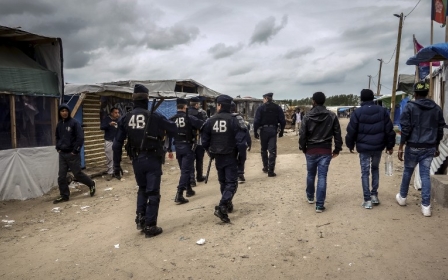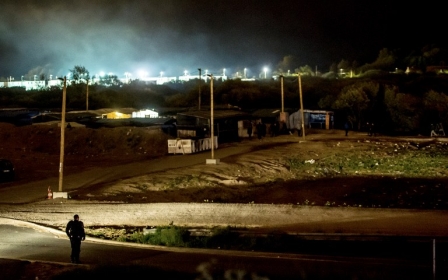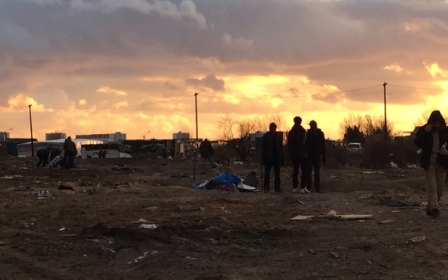Truckers and farmers block Calais roads in protest over migrant camps
Dozens of trucks and tractors took to the roads of the French port of Calais on Monday morning to block traffic in protest at the impact of growing numbers of asylum seekers and migrants on the town.
Answering a call from drivers’ and farmers’ unions, the vehicles set off from different assembly points towards Calais at around 08:00 local time (0600 GMT).
Residents of Calais, local shopkeepers and workers from the harbour also marched along the motorway on foot, forming a human chain to stop traffic.
Thousands of people are living in squalid makeshift camps in Calais, waiting for a chance to reach Britain – many regularly try to force their way onto vehicles heading there by ferry and the underwater rail tunnel.
A recent survey of camp residents carried out by UK-based NGO Refugee Rights Data Project found that the largest proportion had been living in the camp for a month, while nearly one in 10 had lived there for over a year.
Around a third of those surveyed said they wanted to travel to the UK because they already speak English, while a fifth said they already have family in the country.
Attempts to cross into the UK have continued in the face of extra security staff and the construction of high fences along road and rail routes, with the help of funding from the French and UK governments.
"We have to do this. We have to escalate things, because for months now the situation has been getting worse and worse," said David Sagnard, president of the FNTR national truck drivers' federation, as the convoys, each with about 40 vehicles, set off.
"Before, it was just attempts to get on trucks. Now there is looting and wilful destruction, tarpaulins are slashed, goods stolen or destroyed ... Drivers go to work with fear in their bellies, and the economic consequences are severe," he said.
The operation has been dubbed Operation Snail, or Operation Escargot in French. The protest blocked the main road into Calais, the A16, causing tailbacks expected to last several hours.
Calais has become the focus of political debate in both France and Britain - on Monday politicians from the right-wing UKIP party showed their support for the protest on Twitter.
Fears of growing numbers of migrants, partly fuelled by scenes from Calais, were a key issue influencing Britain's vote to quit the European Union earlier this summer following a campaign led by then-UKIP leader Nigel Farage.
Some French opposition politicians have also called for the ditching of an agreement under which border controls take place on the French side of the sea, saying Britain should handle the problem.
In February and March this year, French authorities dismantled the southern half of Calais' so-called "jungle" migrant camp and dispersed some of its inhabitants.
Last week, Interior Minister Bernard Cazeneuve said French authorities would dismantle the rest.
About 7,000 people are living in the remaining northern half of the camp, up from 4,500 in June, according to local authorities. Humanitarian groups put the number closer to 9,000.
Authorities have also put up shelters and welcome centres for the migrants, saying they will build more and increase the number of police officers to help manage the crisis.
Middle East Eye propose une couverture et une analyse indépendantes et incomparables du Moyen-Orient, de l’Afrique du Nord et d’autres régions du monde. Pour en savoir plus sur la reprise de ce contenu et les frais qui s’appliquent, veuillez remplir ce formulaire [en anglais]. Pour en savoir plus sur MEE, cliquez ici [en anglais].




